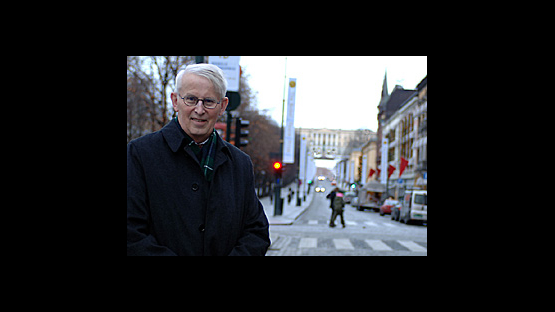With the Peace Prize ceremony only one day away, Chairman of the Norwegian Nobel Committee, Ole Danbolt Mjøs, gives an insider's glimpse at the 2005 peace prize. In a candid interview, he describes why the IAEA and its Director General was chosen, how their success will be measured, and why this years' award is a challenge to all to eliminate nuclear weapons.
Choosing the winner of the world's most coveted peace prize is no small task. It takes the Committee of five Norwegians - three women and two men - around eight months to decide, Prof. Mjøs says.
Prof. Mjøs says the Committee chose the IAEA and Dr. ElBaradei largely for their efforts to stop the spread of nuclear weapons and, he adds, for the work that people expect the Agency should do in the future.
"You have to keep the pressure on the fight against atomic weapons and for the reduction of atomic weapons in those countries that already have them," Prof. Mjøs says. "The ultimate goal is to eliminate them, if we can have that as a hope."
At a time of increasing threat from the proliferation of nuclear weapons, the IAEA is the only international organization tasked to halt their spread, Prof. Mjøs says. The Noble Committee hoped the award would inspire the Agency in its work.
"Who could replace IAEA today on these matters? There is no one else. Because each nation on its own can not do this. Society has given the IAEA a mandate to work in cooperation with different nations."It can be an organization that has a leader that is only following strict rules. Or as in the case of the IAEA, with a leader who has a vision, who has a mission, who has courage to do it - in collaboration with 2 300 people who work at the IAEA. You are awarded this together. There is nobody else," Prof. Mjøs says.
Central to the Committee's decision was the courage shown by the IAEA's chief. "Dr. ElBaradei is leading much of the debate about nuclear weapons. He is not just following rules, but he is giving the Agency a face... Dr. ElBaradei stands firm on his principles that he is actively working to reduce nuclear weapons. Irrespective of how other people feel, he does it. He stands firm and he has courage," Prof. Mjøs says.
With the prize's recognition, also come heavy expectations. The measure of success will be the IAEA's and its Director General's ability to not only hinder the proliferation of atomic weapons, but to reduce stockpiles of nuclear weapons, Prof. Mjøs says.
Yesterday an excited group of people - young and old - braved the Norwegian cold to wait for the arrival of the Peace Prize winners in Oslo. This Saturday tens of thousands of people will turn on their televisions to watch the Director General and the IAEA as Prof. Mjøs hands them the Nobel medal for peace.
What is it that gives this prize so much allure?
Perhaps it's the million dollars that accompanies the prize. Or as Prof. Mjøs believes the award's 100 year history of mostly getting it right. "Most of the choices are good," Prof. Mjøs says. Probably the biggest blight, that Mahatma Gandhi never received the prize, despite five nominations.
Like most years, the 2005 award was not without controversy. The reactions that IAEA won were mostly positive, Prof. Mjøs says, but there have been some criticism regarding what the IAEA had achieved.
"Our impression was there has been plus and minuses but the steady work that has been done by the IAEA since its establishment has had successes and in addition, it is critical for the future of a peaceful world."
Prof. Mjøs insists on the fact that the attribution of the Nobel Peace Prize to the IAEA and its Director General is a challenge to every nation, to all powerful persons, every man and woman, to the whole world, that we must fight nuclear weapons. We must reduce and eliminate them. "It is a challenge, with great expectations for everybody to work along the lines of Dr. ElBaradei and the IAEA".


